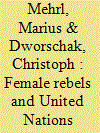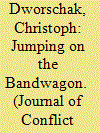|
|
|
Sort Order |
|
|
|
Items / Page
|
|
|
|
|
|
|
| Srl | Item |
| 1 |
ID:
188705


|
|
|
|
|
| Summary/Abstract |
How does the presence of female rebel combatants during conflict influence the likelihood of United Nations post-conflict peacekeeping deployment? While past literature on peacekeeping emphasizes the role of conflict attributes and security council interests, only few studies investigate the importance of belligerent characteristics. We argue that, because dominant gender stereotypes paint women as peaceful, female rebel combatants lead domestic and international audiences to perceive conflicts in which they fight as more severe. Given that recent UN resolutions and mission mandates align with these stereotypes, this in turn, causes the UN to intervene and deploy peacekeepers. Multivariate regression models drawing on a global sample of UN post-conflict missions provide empirical support for our hypothesis. Our findings add to the growing body of literature emphasizing the role of women in combat roles, and contribute to the discussion on the UN’s Women, Peace, and Security agenda.
|
|
|
|
|
|
|
|
|
|
|
|
|
|
|
|
| 2 |
ID:
173134


|
|
|
|
|
| Summary/Abstract |
When confronted with mass uprisings, governments deploy their security forces for crowd control or repression. However, sometimes security agencies choose to side with the opposition movement. Recent work shows that “fragmentation” contributes to defection: fragmenting the security forces into parallel units leads to oversight problems and grievances among soldiers, which raises the risk of members of the security forces defecting to the opposition movement. However, I argue that the effect on defection is strongly moderated by the circumstances under which states choose to fragment their military: fragmentation for the purpose of security specialization, called “differentiation,” even decreases its risk. Employing Bayesian multilevel modeling, the findings corroborate this distinction. The study contributes to the fundamental discussion on civil–military relations, shedding light on why some conflict situations see security defections while others do not. Understanding this phenomenon is a pivotal element to explaining how conflicts develop, escalate, and end.
|
|
|
|
|
|
|
|
|
|
|
|
|
|
|
|
| 3 |
ID:
193121


|
|
|
|
|
| Summary/Abstract |
How does political imprisonment influence anti-regime protest? We argue that political imprisonment facilitates rather than stifles protest. Political imprisonment is a salient indicator of arbitrary rule creating ‘embodied grievances’. It enables the formation of dissident networks within prisons, and serves as a legitimating credential for former inmates to lead resistance. These mechanisms imply that political imprisonment is a self-defeating strategy, making it easier for the opposition to overcome their collective action problem. We test our argument with subnational data from the German Democratic Republic between 1984 and 1989. To account for endogenous latent dissent, we use originally collected archival data on local surveillance operations. Exploiting daily variation in the timing of protests in 1989, we analyze the long-term impact of political imprisonment on mobilization. Results from survival analyses lend support to our hypothesized relationship. Combined with semi-structured interviews to probe our mechanisms, our findings suggest that political imprisonment increases the likelihood of protest mobilization.
|
|
|
|
|
|
|
|
|
|
|
|
|
|
|
|
|
|
|
|
|